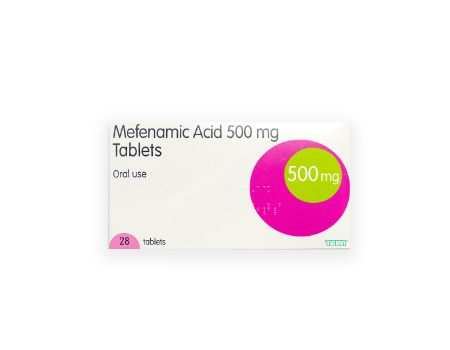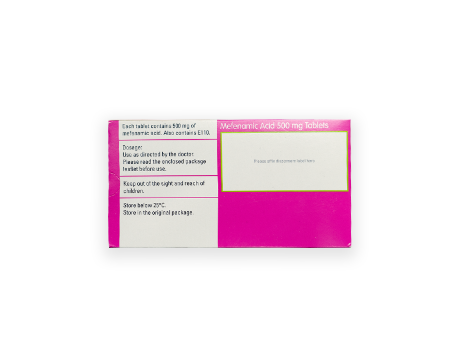What are period pains?
Period pains are quite common, and women of varying ages may experience them during
their menstrual cycle. These pains normally include uncomfortable muscle cramps in your
stomach and can also be felt on your back and thighs. Period pains may vary in their
presentation from constant dull pains to intense cramps. If the pains are felt constantly and
cause discomfort at the onset of your period then medication can be taken to reduce the
pain and cramps.
What is Mefenamic Acid?
Mefenamic acid belongs to the group of medications called non-steroidal anti-inflammatory
drugs (NSAIDs). This medication is used to help relieve pain and help alleviate heavy
bleeding in periods. Mefenamic acid is suggested to work by inhibiting the level of
prostaglandin synthesis in the uterus lining. Prostaglandins are responsible for the feeling of
cramps.
How do I take Mefenamic Acid?
It is recommended to take this medication with or right after meals, swallow these tablets
whole with water. Undesirable effects may be minimised by using the lowest effective
dose for the shortest duration necessary to control symptoms. The standard dose for
adults is 500mg, and this is to be taken 3 times a day. Before initiating any treatment make
sure you consult your Doctor or Pharmacist to see what strength is suitable for your needs.
FAQ's
Mefenamic acid or paracetamol: which is better?
NSAIDs, such as mefenamic acid, have been demonstrated to be more efficient than
placebo in the treatment of period pain. According to studies, NSAIDs are more efficient than
paracetamol in relieving period discomfort. Mefenamic acid can be used with paracetamol,
which is a popular and generally safe pain reliever.
Is it possible to stop periods with mefenamic acid?
Period discomfort can be relieved with mefenamic acid; however, it does not prevent
periods. It can help to relieve abdominal pains and cramping, and also ease heavy periods.
Are ibuprofen and mefenamic acid the same thing?
It's not the same as ibuprofen. Both treatments, nevertheless, belong to the same class of
pharmaceuticals known as nonsteroidal anti-inflammatory drugs (NSAIDs). These are
frequently used against mild to moderate pain and swelling in a variety of conditions. They
should not be taken together as it increases the risks of abdominal pain and ulcers.
Is mefenamic acid available over the counter?
Mefenamic is a prescription-only medication and thus not available over-the-counter in the
United Kingdom. You can however get a tailored prescription made for you online via
IQDoctor by filling out a short questionnaire. Our prescribers will make a quick assessment
of its suitability and we can ship it straight to your door.
What should I do if I forget to take a Mefenamic Acid dose?
If you've just missed one dosage, it's okay to take it as soon as you recall and resume your
regular schedule. However, you should not take a double dosage if your next dose is
approaching. Simply skip the missing dosage and go on with your regular schedule. It's
critical not to double up on your medication in an attempt to make up for a missed dosage.
When you take too much mefenamic acid in a short period of time, you risk developing
negative effects and can overdose on it. Always consult your doctor or pharmacist if you are
unsure.
Is it safe for me to use mefenamic acid while breastfeeding?
Mefenamic acid should not be taken when nursing. Trace amounts of mefenamic acid may
enter the breast milk and affect the nursing child. Therefore, manufacturers advise avoiding
mefenamic acid whilst breastfeeding.
Is it okay for me to use mefenamic acid while on the pill?
Yes, using your birth control pill while taking mefenamic acid is perfectly safe. Additionally,
combined contraception drugs (which include both progesterone and oestrogen) might also
assist with unpleasant and heavy periods, so consult your doctor and discuss the options of
switching to a combined contraception drug.
Is it okay for me to drink while taking mefenamic acid?
You should avoid drinking if you're on mefenamic acid. When you drink alcohol, mefenamic
acid may interact with it, causing stomach pain and other adverse effects. It can also
increase the risk of bleeding in your stomach or intestines under certain circumstances.




